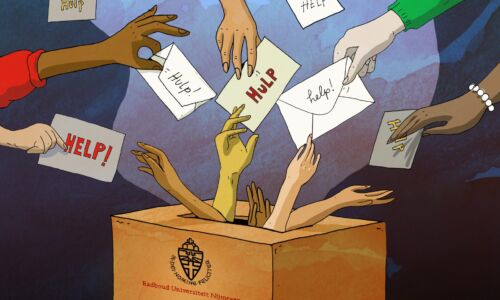‘We need to rethink social safety at Radboud University’
-
 Berchmanianum. Foto: Johannes Fiebig
Berchmanianum. Foto: Johannes Fiebig
OPINION - According to associate professor Frank Bohn, social safety related to power and dependency relationships is not adequately addressed by the executive board (CvB). He provocatively describes an "unholy trinity" of CvB, social safety, and organizational power, leading to a lack of trust among employees. Bohn advocates for strengthening the ombuds officer’s role to better support individuals facing social safety issues and restore trust in the university.
Ever since I have been active in participational bodies of the university (Medezeggenschap), social safety has been a hot topic of discussion at Radboud University. For four years I was a member of the faculty council (FGV), then, since 2021 I have been a member of the works council (GV).
There have been numerous critical and in-depth discussions of social safety in these participational bodies. At the same time, the university and its actions have been repeatedly critically debated in the Vox and De Gelderlander. Most recently, the contested appointment of a dean by the CvB created turmoil and anxiety amongst colleagues at the law faculty.
In March 2024, Vox reported about the resignation of the previous ombuds officer, Nancy Viellevoye. She felt that her initiatives for promoting social safety were ignored or undercut by the CvB. These visible cases suggest that a lot is at stake when it comes to social safety at Radboud University.
Bullying, intimidation and harassment
Let me first clarify what I mean by social safety at the university. What is not meant is the publicly guaranteed financial safety in case of unemployment, disability, etc. Instead, social safety in this context refers to a work environment that guarantees an intimidation-free and coercion-free day-to-day life, as well as fair prospects for personal development in the future. Social safety is so important because it heavily affects job satisfaction and – academic and general – productivity.
Life at Radboud University can be perceived as unsafe for two major separate (though related) reasons. First, there is a general form of unsafety because of bullying, intimidation, or harassment, including sexual harassment. Second, there is a specific form of unsafety caused by organizational power.
This relates to power relationships, for instance, with PhD supervisors, work supervisors (leidinggevenden), heads, directors or deans. This also relates to dependency relationships when colleagues are excluded from decision-making or sidelined by a group of string-pulling colleagues. Without diminishing the importance of the first (general) form of social safety, it is the second (specific) form of social safety that I would like to focus on in this article.
Power and dependency relationships
It took a while for the CvB to recognize the second form of social unsafety when they developed their Prevent-Care-Cure plan. I remember an early discussion in which power-related social safety played no role at all. But why is social safety related to organizational power so relevant at our university?
If you have a supportive supervisor, you might not be aware of this issue. However, members of the trade unions know of several dozen cases, spread over all faculties, where socially unsafe situations have been caused by power or dependency relationships. Because of privacy concerns, many cases are not known, even if they happen in your direct environment.
Suffering from power or dependency relationships can affect anybody. And every case should be taken seriously. However, we have learned that it seems to affect internationals more often and even happens to high-profile internationals the university managed to attract. This may be caused by a cultural clash – it might simply be easier or more convenient to deal with similarly minded colleagues of the same nationality. However, there is also talk of nests of Dutch colleagues who are running the show, deliberately sidelining international colleagues.
Wrong approach
What is the CvB’s answer to the aforementioned problems caused by power and dependency relationships? How did the CvB respond to the balanced and well-formulated critique by the previous ombuds officer? The response has been disappointing. Complicated policy documents. Limiting the role of the ombuds officer (still only 0.6 fte) for resolving individual cases.
‘Increasing the number of people responsible does not help to solve the problems, and it does not help to make employees feel safe’
Instead, a multitude of people who are supposed to deal with social safety concerns: human resources, supervisors (leidinggevenden), faculty confidential contact persons (vertrouwenscontactpersonen), confidential advisors (vertrouwenspersonen), ombuds officer, complaints commission. In my opinion, this is a fundamentally wrong approach.
Increasing the number of people responsible does not help to solve the problems, and it does not help to make employees feel safe. There are too many employees who feel unsafe but do not dare to pursue the issue at hand. As a consequence, unsafe situations persist. This is why I have proposed to strengthen the role of the ombuds officer in previous meetings of the works council.
Sufficient capacity, independence and effectiveness
An ombuds office should have three elements. First, there should be a group of ombuds officers who are running their own unaffiliated desk to receive all complaints. Second, all ombuds officers should be completely independent of the CvB and only have to report to the Supervisory Board (Raad van Toezicht). Had this been the case before, initiatives by the previous ombuds officer, Nancy Viellevoye, could not have been ignored by the CvB (see aforementioned Vox article). Third, there should be sufficient capacity so that any employee who is suffering from an unsafe situation can be accompanied from the beginning of their complaint until its resolution.
This could be effective for various reasons. First, if employees know that they are supported by the ombuds officer from beginning to end, they can trust the resolution process and dare to address social safety issues. Obviously, the fact that an ombuds officer stays on your side does not guarantee that you always get what you want. However, it does reassure you that your case could actually lead to substantial organizational consequences and that you are protected against potential repercussions.
‘If “perpetrators” experience that social safety complaints can have serious consequences for their own position, they are more careful about abusing their power’
Second, if employees see that issues are resolved, their trust in the institution is restored. This encourages others to become more outspoken about problematic situations. Third, if “perpetrators” (i.e., those who cause unsafe situations) experience that social safety complaints can have serious consequences for their own position, they are more careful about abusing their power.
Finally, this is also cost-effective. The additional ombuds officers cost money, but much higher costs are produced by internal commissions for drawing up and supervising policy, external advisory and complaints commissions, legal costs when employees sue the university and farewell arrangements for departing employees.
Blunt critique
There has been so much talk about social safety. Yet, for many employees, there remains this feeling of not being safe. I think we must find an effective way of stopping it. Policy documents and complex procedures are not helpful. Establishing an ombuds office and allowing the ombuds officers to help individuals hands-on would be an effective and cost-efficient way forward.
I know this is a blunt critique of what is going on, but I do think it is necessary to come forth, even if this entails harsh responses or even repercussions for myself.





Job van Luyken, Ombudsofficer Employees schreef op 8 april 2025 om 11:38
As an ombudsman with a differing (personal) perspective on the Ombudsrole I believe that the current framework adequately addresses social safety concerns, and the addition of more ombuds officers may not yield the desired improvements.
The introduction of ombuds officers in Dutch universities was driven by a commitment to fostering a safe and supportive environment for both staff and students. Their primary function is to provide an independent, impartial, and confidential avenue for addressing grievances, mediating disputes, and identifying systemic issues within the institution. This role is crucial in ensuring that concerns are addressed promptly and fairly, contributing to the overall well-being of the university community.
Frank Bohn suggests that increasing the number of Ombudsofficers is essential to enhance social safety at Radboud University. However, I contend that this approach may not be the most effective solution.
1. Effectiveness of Current Structures: The existing ombuds framework, complemented by confidential advisers and other support mechanisms, provides comprehensive coverage for addressing social safety issues. Introducing additional Ombudsofficers could lead to overlapping responsibilities and potential confusion among staff and students regarding the appropriate channels for their concerns. An Ombudsofficer acts on signals, is not a police-officer, not a personal advocate. The Ombudsofficer is there to deal with problems and stick to these until they are resolved.
2. Focus on Preventative Measures: Rather than expanding the ombuds office, emphasis should be placed on preventative strategies such as training programs, clear policies, and fostering an inclusive culture. And even more important: enhance the psychological safety that is needed for employees and students to address issues that worry them. This kind of initiatives address the root causes of social safety issues, reducing the need for intervention after incidents occur. Prevention also means clear consequences in case social safety is being compromised.
3. Resource Allocation: Universities operate within finite budgets. Allocating additional funds to expand the ombuds office may divert resources from other critical areas that deal with social/psychological issues. A balanced approach ensures that all aspects of the university’s mission are adequately funded.
4. Empowerment of Existing Roles: Enhancing the authority and visibility of current ombuds officers can be more effective than increasing their numbers. Ensuring that they have the necessary support and are viewed as an independent actor can lead to more meaningful improvements in social safety.
Frank Bohn also suggests that the current Ombudsofficers are not running their own unaffiliated desk to receive all complaints. That is simply not correct, because the Ombudsofficers do exactly that. We also rather talk about “meldingen” than complaints. Secondly, he suggests that Ombudsofficers are not completely independent of the CvB and therefore only must report to the Supervisory Board (Raad van Toezicht). That is a misconception. I, as an Ombudsofficer, can (and will) only function if the independence, and trustworthiness, autonomy and integrity is beyond any doubt. The Ombudsofficer reports in general by means of an annual report in which findings, trends, attention points, suggestions are addressed. The annual report is presented and discussed with the CvB and the Supervisory board. And with the works council and many others by the way. If and if so, what initiatives by the previous ombuds officer have been ignored by the CvB and why, I do not know. Up till today I have not encountered similar issues as she reported in her interview so maybe there was a learning process. Also, there are various ways to influence decision makers.
In conclusion, while Frank Bohn’s intent behind advocating for more Ombudsofficers stems from – what I truly believe to be – a genuine concern for social safety, a more strategic approach involves strengthening existing structures, focusing on prevention, and ensuring efficient use of resources. This holistic strategy is more likely to yield sustainable improvements in the university’s social environment.
Frank Bohn schreef op 11 april 2025 om 11:08
Dear Job,
I appreciate your differing views. However, it would have been nice to allow some space for other comments instead of replying immediately with the presumed authority of the current ombuds officer.
The previous ombuds officer certainly had a very different view to yours.
On substance:
1. Effectiveness: why should having several ombuds officers lead to overlapping responsibilities? In contrast, this is exactly what is happening now with the many roles and functions.
The previous ombuds officer felt that it was impossible to stick to the problems until they were resolved.
2. Focus on preventive measures: it is the lack of trust in the system that discourages people from speaking up. I do not see the clear consequences for breach of social safety. I wonder why you are playing down the existing problems.
3. Resource allocation: There is nothing balanced by creating complexity. That and the consequences of legal fights are certainly more expensive than a few ombuds officers. Is there another reason why you would not want to have other ombuds officers beside you?
4. Empowerment of Existing Roles: giving the ombuds officer a more central would achieve just that.
Independence: the ombuds officer is not independent. There were good reason for the previous ombuds officer to step down.
Unfortunately, I doubt that the complex structure yields sustainable improvments and can restore the missing trust in wide parts of the university community.
Cheers
Frank
Job van Luyken, Ombudsofficer Employees schreef op 17 april 2025 om 16:55
Dear Frank, I can’t help that I was maybe the first to read your opinion (or was maybe the first willing to react). But to avoid to have discussions/reactions based on disturbing misconceptions on what an ombudsofficer can or cannot do, why this role is needed I felt the responsibility to react. And to argue why I think your plan is actually …….., well to be honest, not a very good plan. What you seem to want is a social advocate with the power of a judge. That is not what this role is for. Nor would it be good have such a role inside the university. You seem to prefer a stick, whereas I prefer a carrot to change the university to be the safest place to study, to work for and to deal with. Anyway, willing to discuss any time, on- or offline.
Frank Bohn schreef op 22 april 2025 om 19:51
Dear Job, I guess we disagree fundamentally on a number of issues (which you call “disturbing misconceptions” on my part):
1. I believe there is an almost desperate need for support for colleagues who have suffered from social safety issues. I have heard from numerous cases where colleagues got mentally or physically sick because they did not feel protected. In many cases, they did not dare to complain for fear of repercussions.
2. These victims of harassment or power abuse cannot be protected with a complex architecture of social safety. They need one (and only one) point of contact who stays with them from beginning to end.
3. I never said that the ombuds officer should be the judge. However, s/he should be a social advocate and ensure that the complainant feels safe and is actually protected from repercussions by the culprit or the institution (be it the faculty or the university).
4. Even though one typically does not hear about social safety issues, they do occur in our direct neighbourhood. It is a serious and very disturbing reality at the Radboud University.